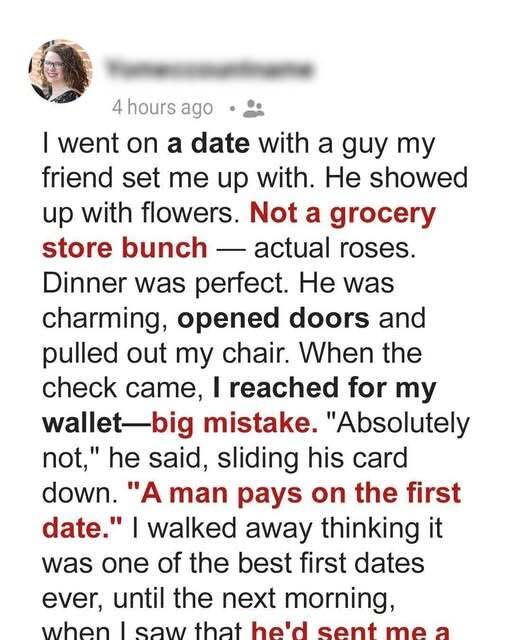When Eric offered to pay for the first date, he seemed like the perfect gentleman. He arrived with roses, a small gift, and a warm smile, making a great first impression. Mia, the friend who introduced them, had promised they’d get along, and the evening confirmed it. Dinner went smoothly—Eric was attentive, charming, and seemed genuinely interested, remembering details from their chats and treating her with courtesy throughout the night.
When the bill came, he insisted on paying, declaring that “a man always pays on the first date.” The gesture left her impressed and hopeful about what could follow. But the next morning shattered that image completely when she received a message from him—not a sweet note, but an invoice.
The invoice listed “charges” for the date: the roses, gift, and even the act of pulling out her chair or opening the car door. Each item bizarrely required “repayment,” ranging from a hug or selfie to a promise of a second date. At the bottom, it threatened “collections” and mentioned someone named Chris, leaving her confused and stunned.
Perplexed, she forwarded the message to Mia, who burst out laughing. Mia’s boyfriend, Chris, decided to respond with humor—sending Eric a counter-invoice billing him $1,000 for “wasting a perfectly good evening” of her time. The situation turned comical, but Eric didn’t take it lightly.
He responded with angry texts, calling her ungrateful and manipulative, which prompted her to block him entirely. What had started as a promising connection quickly unraveled into absurdity.
In the end, she kept the small keychain he gave her—not as a keepsake of romance, but as a funny reminder of how first impressions can be misleading. Some red flags, she learned, don’t appear at dinner—they arrive in your inbox the next morning.
